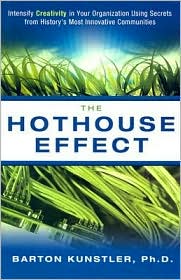 The Boston Chapter of the Association for Strategic Planning delights in bringing distinguished thinkers and speakers to our monthly networking coffees in Burlington, and our meeting on October 7th with author, professor, consultant and--best of all--wit Dr. Barton Kunstler was a standout example of the talent we bring to our audience.
The Boston Chapter of the Association for Strategic Planning delights in bringing distinguished thinkers and speakers to our monthly networking coffees in Burlington, and our meeting on October 7th with author, professor, consultant and--best of all--wit Dr. Barton Kunstler was a standout example of the talent we bring to our audience.Barton's book, The Hothouse Effect, surveys and integrates creativity in history and modern organizations, including such high performing historical contexts as Florence during the Renaissance, the US Jazz Community, artists and painters in Paris, politics and the arts in Athens, and the early 20th century physicists in Europe. "Why them? What made them so incredibly creative? Is it an accident of birth?"
Barton discussed the five distinguishing characteristics of each of these "scenes" and then applied them to specific currently active organizations, such as LoopDesigns in Bologna Italy or Sequent Computing in the US (sold to IBM in 1999):
"1. High level of creativity for a significant amount of time, e.g., 200 years in Athens
"2. Drawing on a broad cultural zone that a particular community distills and brings to a higher level. It is as if the system talks to itself. If we really want to tap the potential of what is going on here, we’ve got to pick one focus and siphon all of our energy into it. Odds on Athens becoming that community were like 100:1.
"3. Having a disproportionate number of genius and brilliants. That raises the bar of general population is raised as well. More involved in the general activity. Think of Flore
 nce in the Medici era. Leonardo and Machiavelli were good friends. No other place has those type of names associated with it. In our society we’re still stuck with pointing toward a single brilliant person. Society creates its own geniuses and brilliants. Athens came up with the perfect type of guy to face the threat of the day.
nce in the Medici era. Leonardo and Machiavelli were good friends. No other place has those type of names associated with it. In our society we’re still stuck with pointing toward a single brilliant person. Society creates its own geniuses and brilliants. Athens came up with the perfect type of guy to face the threat of the day."4. Create a whole new way of thinking, new disciplines entirely. New standards, procedures, principles.
"5. Everyone, all of the contemporaries of these great creative contexts knew of what was going on. The Greeks looked at the Athenians and said, “These are a new type of people.” They’re weird. They become a reference frame for later generations. The 60s were like that. I’m happier now than I was in 1968, but that’s not the point. Something amazing was happening in the collective mind.
"We live in disintegrative times; creativity is integrative and counter-entropic. How do we think as a collective on a level that will meet these challenges that we have? Listen to highly charged quality of creativity and analytical thought. That’s what the hothouse groups have. It's amazing how much bureaucracy screws up. This anchors us in something else. It's like the difference between the metaphor of a mountain where someone is supposed to be sitting on top knowing what is going on versus a volcano where the energy is spilling up, out and all over the place."
ASP Boston is bringing some great energy, thought and experience to those tables at Panera in Burlington. Join us!

No comments:
Post a Comment